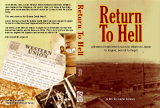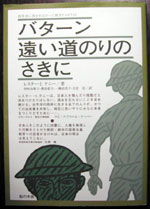
Lester Tenney: ex-POW and Survivor of the Bataan Death March Passed Away on 24 February 2017
A video documentary: "Return To Hell" (available on request)
Glenn Tenney (mailto: dvd060623 at gtenney dot com) has produced a DVD video documentary following Lester Tenney's return to Japan to visit the coal mine where he was a POW. You'll be able to watch and listen as Lester Tenney remembers his experiences of World War II beginning when his National Guard unit arrived in the Philippines a week before the start of the war, through the Bataan Death March, his witnessing the atomic bomb at Nagasaki, what it was like to return to the U.S. afterward -- and how he has learned to forgive and get on with his life. Watch the two minute trailer of "Return To Hell" now.
|
|
Dr. Lester Tenney survived the Bataan Death March (April 1942, Phillipines). After arriving at Camp O'Donnell he escaped into the jungles of the Philippines, and was recaptured days later. He survived the "hell ships", a month-long voyage in the hold of a ship from the Phillipines to Omuta. There, he was slave labor as a POW in a coal mine. He witnessed the atomic bomb blast at Nagasaki from the prison camp across the bay from Nagasaki, which ended the war for him a day later. Dr. Tenney wrote an autobiography about some of these experiences, "My Hitch in Hell". Purchase this book in paperback at Amazon.com. Find out more about "My Hitch in Hell" (including the table-of-contents and a chapter from the book). |
24 February 2017 -- Les Tenney passed away. One of the last few survivors of the Bataan Death March is now just in our memories.
12 September 2010 -- Les Tenney leads a group of six survivors back to Japan paid for by the Japanese government
The San Diego Union Tribune had a piece about this amazing trip -- amazing in that it ever happened, but it is happening due to Les Tenney's relentless push with the U.S. State Department and the Japanese government
http://www.signonsandiego.com/news/2010/sep/12/lester-tenney-marches-back-japan/
... "A Bataan Death March survivor, Tenney arrived in Tokyo Sunday with five other former POWs and eight family members, the first American delegation in the “Peace, Friendship and Exchange Initiative.”
They’ll be met with exquisite hospitality. They’ll be hit with painful emotions." ...
15 August 2005 -- Sixty years ago today the POWs in Japan were freed
War has ended, but not the memories
By Lester Tenney
( published
as an op-ed in the San Diego Union Tribune)
Sixty years ago today, World War II came to an abrupt end, similar in many respects to the abrupt beginning on that fateful day in December 1941. Between the beginning of this war and its formal ending on Sept. 2, 1945, there were many events that have remained in our memory, events of horror and deprivation, events of death and dying, events of pain and suffering, events of happiness and humility.
During the period between the fall of the Philippines and the end of hostilities there was the Bataan Death March, where thousands of Americans were slaughtered like cattle, where thousands more who were healthy enough to become slave laborers were forced to travel to Japan on Hell Ships on which the Japanese forbade Red Cross markings to identify them as carrying American POWs. American planes and warships, not knowing that Americans were on board these freighters, bombed and torpedoed them, turning them into sailing coffins, putting thousands of Americans into a watery grave. Those of us who survived this ordeal ended up in Japan, forced to shovel coal in dangerous coal mines, or working untold hours in zinc mines or on loading docks, or forced to manufacture war supplies for the enemy. These tragic events took the lives of hundreds more Americans who waited patiently for the war to end. It was these tragic events that caused us to bring a lawsuit against the Japanese companies that enslaved and abused us. Yet we were turned back, turned back by our own State Department, which chose to defend the Japanese actions.
You see, the war has ended, but the memory lingers on.
Let me explain. My fight against the Japanese company that abused and tortured me is not about money. It has never been about money. It has been about honor, dignity and responsibility. Like the great country of Japan, we too take pride in our honor and dignity, but it was taken from us, and now we want it restored, restored by those who violated our rights as human beings. We want those who abused us and stole our honor to accept their responsibility, which would be the honorable thing to do. And as we all know, Japan sees itself as the epitome and creator of the meaning of honor. The Supreme Court, after hearing from our State Department, recently decided not to allow our case to be heard in a court of law. I would hope that in spite of the court's decision, Japan will want to solve the problem of responsibility, which will then restore its noble place among nations and show the world that honor and responsibility are the ingredients necessary to entitle it to a seat on the U.N. Security Council.
If Japan, and the companies that abused American POWs, do not accept responsibility, they should never be allowed a seat and a vote on the Security Council. Without an offer of remorse, without a meaningful apology, giving Japan a seat on the council would be a travesty of justice. Japan could never undo the wrong it committed against us survivors without first accepting its responsibility and atone for its actions. I have asked myself often these past 60 years what was it that caused Japanese soldiers to slaughter thousands of men on the Bataan march, to shoot them, bayonet them or decapitate them for not walking fast enough, for not bowing low enough, or for simply wanting a drink of water?
I have also wondered many times, was it greed that caused the companies to allow their employees to beat us with pick-axes, shovels and hammers, to break our bones, to maim some of us for life or kill so many by failing to provide us with adequate food or needed medical care?
But alas, our country's friendship with the Japanese has created an unwillingness on their part to come to grips with their past and apologize for their transgressions during their ill-fought campaign.
But now, this, the 60th anniversary of the end of hostilities, may be a good time for the Japanese government to come forward and issue the apology so badly needed to close a said chapter in Japan's history. If Japan is truly our friend, then as a gesture of friendship, it should commit itself to restoring its honor by apologizing for placing us into servitude, stealing our honor and breaking our bodies.
I have learned to forgive; I have made peace with myself. Now I want those responsible for my servitude and maltreatment to accept their responsibility. You see, hating, I have found, destroys us spiritually, just as the fighting destroyed us bodily.
So I will forgive, if they will accept their responsibility.
Coming in October 2005
Dr. Tenney is an invited speaker at the National D-Day Museum's International Conference on WWII being held in New Orleans, 5-9 October. Dr. Tenney will be speaking on his experiences of the Bataan Death March and as a POW in Japan. See http://www.ww2conference.org/ for more information.
March 2003
 Dr.
Tenney was in Tokyo for the release of his book in Japanese (the picture to
the left is the cover of the book).
Dr.
Tenney was in Tokyo for the release of his book in Japanese (the picture to
the left is the cover of the book).
He spoke at a meeting at the Japanese Diet (which included several members and staff of both Houses) and at the Foreign Correspondents Club of Japan.
During this trip Dr. Tenney also was invited to a one-on-one discussion with Motooka-san, the Vice Speaker of the Upper House.
September 2002
Dr. Tenney testified before the House Judiciary Committee, Subcommittee on Immigration, Border Security and Claims on 25 September 2002 about slave labor of POWs during WW II and the "Justice for U.S. POWs Act" of 2001. Read his remarks to Congress at this hearing.
May 2002
2002 is the 60th anniversary of the Bataan Death March. Dr. Tenney reports
that this year's Memorial
Day Concert broadcast on PBS Sunday 26 May will include a tribute to those
who fought on Bataan and former POWs. From their press release:
2002 is the 60th anniversary of the Bataan Death March. Dr. Tenney reports
that this year's Memorial
Day Concert broadcast on PBS Sunday 26 May will include a tribute to those
who fought on Bataan and former POWs. From their press release:
" To open the World War II segment, Ossie Davis describes the swift Pearl
Harbor attack against the backdrop of archival film footage and introduces actor
and decorated war veteran Charles Durning, who shares the memories of Lester
Tenney, a survivor of the Bataan Death March."
Dr. Tenney also reports that he has been asked to place a wreath on the Tomb
of the Unknowns at Arlington Cemetery this Memorial Day.
From May 2001:
Dr. Les Tenney reports that there should be some coverage of this POW
issue here in the U.S. this coming (2001) memorial day weekend. We don't
know if Dr. Tenney will be featured in all of these media, but he was interviewed
for all of them. As always, one never knows what news events will bump this
topic..
Friday evening, May 25, 2001 -- 20/20 on ABC. Here's what ABC's
20/20 had to say
Monday morning, May 28, 2001 -- the Today Show, NBC
Memorial Day many local TV channels will be able to pick up, free of charge,
a Satellite show of POW issues.
June 17, 2001, Parade Magazine issue in many local Sunday papers.
From August 1999:
A ground breaking lawsuit was filed on August 11, 1999 against Japanese
corporation Mitsui Mining Co. Ltd. and its affiliates, Mitsui & Co. Ltd., Mitsui & Co.
USA Inc. and Mitsui Mining USA. alleging Mitsui subjected an American prisoner
of war, Lester I. Tenney, to slave labor at Mitsui mines from 1943 to 1945.
Tenney's is the first suit to be filed under a state law which
went into effect in July, 1999 giving California courts jurisdiction
to hear World War
II-era slave labor cases and extending the statute of limitations for filing
such suits until December 31, 2010.
For more information contact the
law firm Casey, Gerry, Reed & Schenk
|
You can purchase Lester Tenney's book "My Hitch in Hell" in association with Amazon.com |
|
|
|

|
This page last updated February 28, 2017